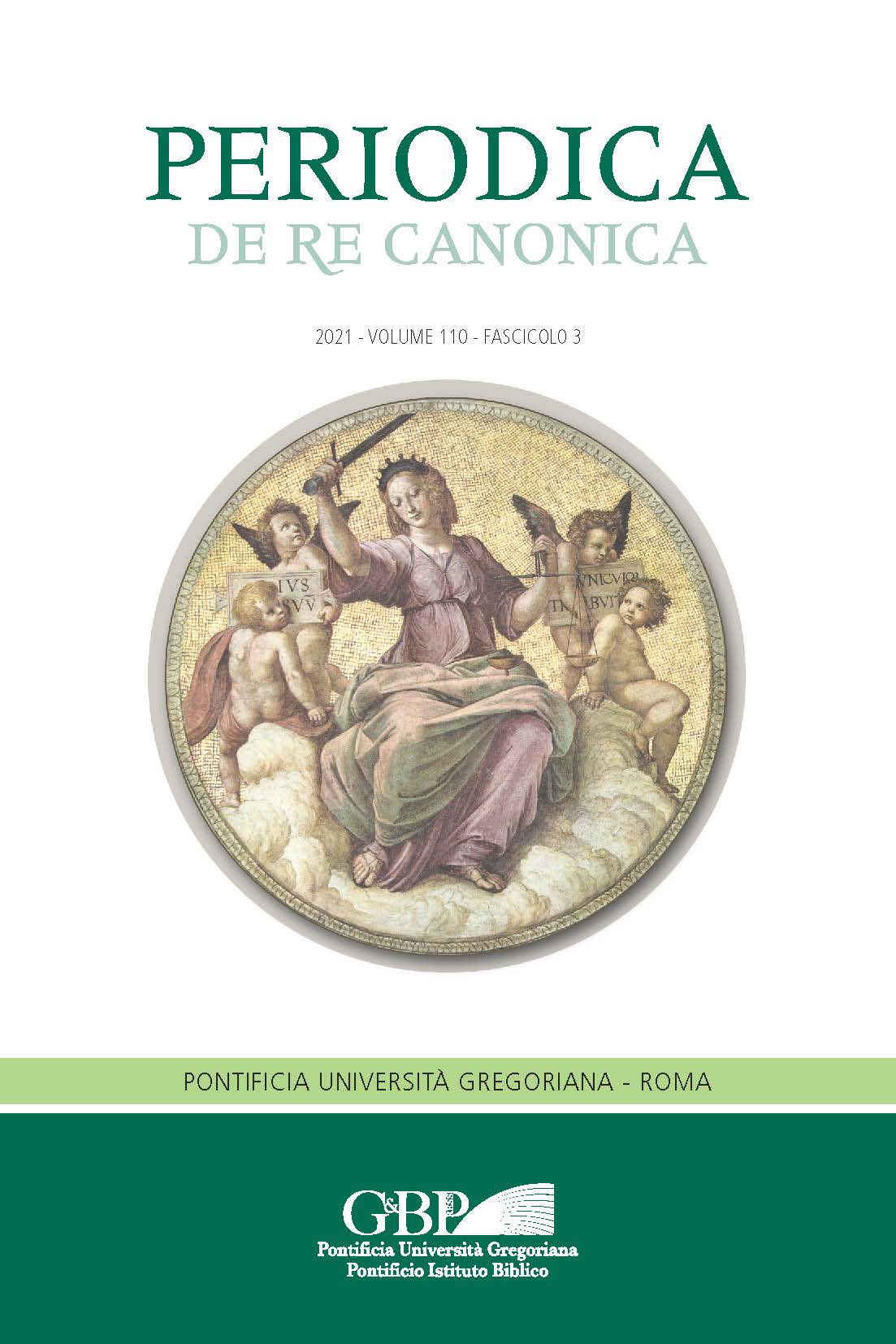Volume 110 - Issue 3
- Home
- Research and Publications
- Periodicals
- Periodica de Re Canonica
- Issues
- 2021
- Volume 110 - Issue 3

PERIODICA DE RE CANONICA - Issue 110/3 (2021)
Issue 110/3 (2021) of the magazine Periodica de Re Canonica, quarterly published by the Faculty of Canon Law of the Pontifical Gregorian University, is now available.
Damián G. Astigueta, S.J., A first reading of the new Book VI of the Code as an instrument of pastoral charity, 351-384
Abstract: Recently the Supreme Pontiff has promulgated a new text for Book VI of the Code of Canon Law, to make it current, feasible in agreement in the light of pastoral charity, which must guide the faithful application of the rules according to the spirit of legal adaptation to the aequitas canonica. An attempt has been made to make the text more suitable for new times and new crimes.
Keywords: Book VI; crime; penalty; prescription.
Gianfranco Ghirlanda, S.J., The Bishop: Father and Pastor of a Portion of the People of God, 385-438
Abstract: This article is based on Christus Dominus 16, that considers the diocesan bishop «pater et pastor» in the exercise of his ministry. Moreover, basing itself on certain canons of Art. 2, Chapter II, Sect. II, Part II, Book II CIC 1983 and also some of the connected canons in the Code, the article shows how the paternal and pastoral character of the government of the diocesan bishop emerges in those aspects in which his personal relationship with the members who form the portion of the people of God who are entrusted to him is involved. Such groups include: all the faithful, without any distinction of age, condition or nationality, but also unique categories, i.e. those who need special pastoral care (workers, sick, migrants, refugees, etc.); priests, in the various needs and conditions in which they may find themselves, especially if in a particular difficulty or crisis; institutes of consecrated life and societies of apostolic life, especially when they arise from the diocese and are of diocesan right, as well as other individual types of consecrated life or new forms of the same; the various groupings of associative life, especially ecclesial movements; the coordination and support of other various forms and works within the apostolate; the active and personal residence of the bishop in the diocese; the pastoral visit of the diocese.
Keywords: Diocesan Bishop; Father; Pastor; Pastoral.
G. Paolo Montini, The documentary process in canon law. The contribution of prof. Piero Antonio Bonnet (1979-2008), 439-457
Abstract: The contribution examines the course and outcome of Professor Bonnet’s studies on the documentary process. The focus is on the nature of this process, which does not belong to the group of summary processes, but to the ex-notorio processes. In fact, it is entirely determined by the evidence that the legislator has decided to use as a basis. On this basis, the peculiarities of the documentary process are explained, especially the postponement to ordinary proceedings in the event that the evidence is not confirmed. The reason for Professor Bonnet’s interest in the documentary process is his conviction that by divine right, a more onerous procedure should not be imposed to ascertain the nullity of a marriage when the circumstances allow for its simplification. The author shows in the contribution how Professor Bonnet’s elaboration on the documentary process corresponds structurally and, in some cases, also literally to the understanding of the processus brevior inaugurated in the recent reform of the process of matrimonial nullity with the motu proprio Mitis Iudex Dominus Iesus.
Keywords: documentary process; Mitis Iudex Dominus Iesus; processus brevior; art. 14 Ratio procedendi
Yuji Sugawara, S.J., Comments on the Instruction Ecclesiae Sponsae Imago, 459-472
Abstract: The Congregation for Institutes of Consecrated Life and Societies of Apostolic Life promulgated in 2018 a document on the Ordo virginum, in the form of an Instruction, entitled Ecclesiae Sponsae Imago. Following the renewal of the Order of consecrated virgins sparked by the Second Vatican Council (cf. Perfectae caritatis 1) and its rapid flourishing in different places around the world, the document seeks to provide elements for the necessary adaptation of consecrated virgins to different local and cultural contexts. The article, after studying the structure of the document (1), explains its content such as the primary responsibility of the diocesan bishop (2), and some canonical elements such as chastity, recourse to psychological experts, association and age requirement and duration of formation (3), and finally presents the general value of the document and some elements as limitations.
Keywords: instruction Ecclesiae Sponsae Imago; order of virgins; consecrated life.
Paweł Malecha, Indulgences granted to the faithful during a visit to a sacred place, 473-501
Abstract: The object of this study concerns the prescribed work for acquiring an indulgence tied to a sacred place. The present argument is of particular importance because it is subject to errors and abuses, and given little attention in the canonical literature.
This article seeks to present such prescribed works for acquiring an indulgence in light of the doctrine on indulgences and the norms for their application.
The study is broken down into four parts: in the first part are treated in brief the general doctrinal and canonical principles on indulgences; in the second the necessary conditions to obtain them; in the third the general norms concerning indulgences connected to the visit of sacred places; and in the last part a closer look will be given to the granting of such indulgences.
Keywords: indulgences; plenary indulgence; partial indulgence; conditions for acquiring an indulgence; sacred places; Apostolic Penitentiary.
Damián G. Astigueta, S.J., The penalty of suspension and its duration: can it be imposed for a fixed period?, 503-506
Paweł Malecha, The impact of the typology of sacred places on the conditions and procedures for reducing them to profane use, 507-514
Stefano Cheula, The office of parish priest according to canon 522. For an analysis of the note on stability in the office and its ecclesiological basis, 515-526